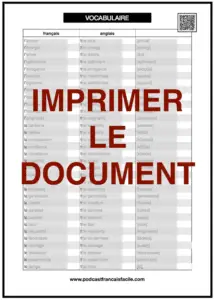✚ Vocabulaire :
problème, dessert, recette, chambre, parents, maison, porte, cuisine, couloir, guitare, livre, histoire, joli, intéressant, amusant, étrange, fermé, grand, sombre, difficile, délicieux, sucré, vrai, récent, clair, étroit, blanc
🔷 Traduisez les phrases suivantes :
1. La guitare est très jolie.
2. Il n'y a pas de livre intéressant.
3. Il y a des histoires amusantes.
4. Il n'y a pas d'histoire étrange.
5. La porte de la cuisine est fermée.
6. La chambre des parents est-elle sombre ?
7. La recette de cuisine est difficile.
8. Le dessert est délicieux.
9. Les desserts sont très sucrés
10. Le dessert est très sucré.
11. Y a-t-il un vrai problème ?
12. Il n'y a pas de problème.
13. Le problème est récent.
14. La chambre est claire.
15. Le couloir est-il étroit ?
16. Le livre n'est pas intéressant.
17. Y a-t-il une histoire étrange ?
18. Le livre n'est pas intéressant.
19. La maison est grande, les pièces sont sombres.
20. Il y a une grande maison blanche.
✚ Exercices de traduction
↳ autour de c'est / il y a / être




